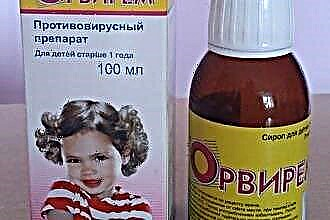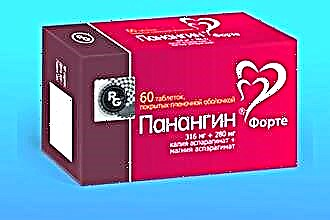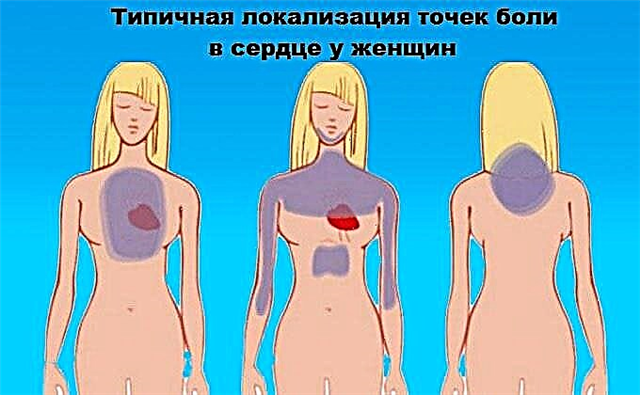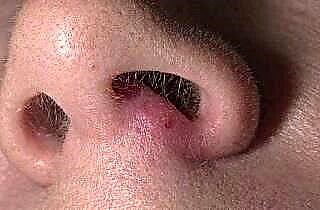Sore throat when swallowing is a symptom that signals the presence of pathological processes in the mucous membranes of the pharynx. When the body's immune defenses are weakened, pathogens penetrate the tissues of the upper respiratory tract and cause inflammation. If the infection is not stopped in a timely manner, the symptoms of an infectious disease will increase, which will negatively affect the patient's well-being.
 The principles of ENT disease treatment depend on the type of infectious agent, the patient's age, the location of the foci of inflammation and the prevalence of pathological processes.
The principles of ENT disease treatment depend on the type of infectious agent, the patient's age, the location of the foci of inflammation and the prevalence of pathological processes.
Complex therapy involves the use of systemic and local drugs.
The former contribute to the destruction of pathogenic agents throughout the body, and the latter - directly in the lesions. Timely treatment of the infection prevents the development of complications and promotes a speedy recovery.
Possible diseases
What to do when your throat hurts and it hurts to swallow? Painful sensations indicate the presence of acute catarrhal processes in the ciliated epithelium and lymphoid tissues. The provocateurs of inflammation can be viruses, protozoa, fungi or bacteria. Due to the insensitivity of viruses to antibacterials, and microbes to antiviral agents, the principles of treatment in each case will be individual.
If the patient's patient swallows saliva and talks, this may signal the development of the following diseases:
- pharyngitis;
- laryngitis;
- laryngotracheitis;
- tracheobronchitis;
- tonsillitis;
- epiglottitis;
- Infectious mononucleosis.
The exact type of pathology can be determined by laboratory analysis of a smear from the throat (bacterial culture), with which it is possible to determine the causative agent of the infection.
Many patients are in no hurry to see an otolaryngologist, hoping to cope with the problem on their own. However, untimely treatment of the disease only contributes to the spread of infection and deterioration of well-being. You cannot postpone a visit to a specialist if:
- pain does not go away within 2-3 days after regular rinsing of the oropharynx;
- pain in the throat only intensifies;
- subfebrile or febrile fever has occurred;
- a white coating appeared on the mucous membrane of the throat and palatine tonsils;
- regional lymph nodes have increased in size and are sore;
- swelling of the pharynx interferes with normal breathing and swallowing of saliva.
In the case of acute tonsillitis, serious local complications may occur, in particular, the pharyngeal abscess. Swelling of the tissues leads to a narrowing of the lumen of the airways and asphyxiation.
Principles of therapy
General symptoms of intoxication and pain when swallowing are good reasons for seeking help from a specialist. Depending on the type of ENT disease, the doctor will draw up a suitable drug treatment regimen, which will include drugs of symptomatic and pathogenetic action:
- analgesic;
- antiviral;
- antihistamines;
- antipyretic;
- antifungal;
- antimicrobial;
 tablets and lozenges for sucking;
tablets and lozenges for sucking;- rinsing solutions;
- drugs for inhalation;
- throat sprays and aerosols.
Intoxication of the body is one of the key causes of the side symptoms of sore throat - hyperthermia, myalgia, weakness, lack of appetite, etc.
To ease the course of the disease, the patient must follow a few simple rules, namely:
- avoid drafts and hypothermia;
- observe bed rest during an exacerbation of the disease;
- drink at least 8 glasses of alkaline (milk with honey, mineral water) and anti-inflammatory (decoction with chamomile, tea with linden) solutions during the day;
- exclude from the diet foods that irritate the mucous membranes of the ENT organs - salty and spicy dishes, tangerines, carbonated drinks, seeds, etc.;
- use vitamin complexes that increase the body's resistance.
Early treatment can speed up recovery and prevent the spread of infection. It is more advisable to start taking medications when the first symptoms of the disease appear. At the same time, one cannot refuse the use of physiotherapeutic procedures that improve tissue trophism and increase local immunity.
When to take antibiotics?
What should you do if it hurts to swallow, sore throat and hurts to speak? Generalized pain in the ENT organs signal the penetration of infection into the deep layers of the mucous membranes of the throat and, possibly, the palatine tonsils. In most cases, these symptoms occur due to the development of bacterial flora. To eliminate the microbial flora and prevent the spread of lesions, it is necessary to take systemic antimicrobial drugs.
It is advisable to take antibiotics in the following cases:
- bacterial sore throat;
- chronic inflammation of the pharynx;
- purulent inflammation of the tonsils;
- sepsis and concomitant acute respiratory infections, bronchitis.
Recurrent inflammation of the pharynx is a clear sign that pathogenic flora of bacterial origin is present in the ENT organs. It is possible to completely eliminate pathogenic bacteria with the help of antibiotics, which can only be prescribed by a specialist.
Antibiotic overview
How to treat ENT disease for bacterial sore throat? There are several types of antibiotics, each of which targets specific disease-causing bacteria. Some drugs are active against gram-positive bacteria, others against gram-negative bacteria, etc.
The following types of antibiotics are usually included in the classical treatment regimen for ENT diseases:
- "Amoxicillin" is a semi-synthetic antibiotic from the group of penicillins, which has a wide spectrum of action; destroys the cell walls of bacteria, which leads to their death;
- "Amoxiclav" - a drug of combined action from the group of penicillins, which helps to destroy gram-positive bacteria; eliminates sore throat and general symptoms of intoxication;
- "Ceftriaxone" is a cephalosporin antibiotic, the components of which are active against most types of bacteria; used to treat complicated diseases accompanied by diarrhea, vomiting, dizziness, etc.;
- "Cefadroxil" - a drug from the group of cephalosporins, which helps to destroy gram-positive and gram-negative microbes; used in the treatment of catarrhal sore throat;

- "Erythromycin" is a macrolide antibiotic that destroys gram-positive and some gram-negative bacteria; it is used to treat bacterial infections at the stage of exacerbation of inflammatory processes in the throat and lungs;
- "Summamed" is a drug from the group of macrolides with prolonged action, which suppresses the development of most microbial strains.
Important! Antibiotic therapy should not be interrupted even with a significant improvement in well-being.
Many patients refuse to take drugs if the symptoms of pathology disappear. Premature withdrawal of antibiotics can lead to recurrence of inflammation. However, with an exacerbation of inflammation, the use of previously prescribed medications may be ineffective. Some types of pathogens become resistant to drugs, as a result of which it is necessary to change the course of therapy, replacing some antibiotics with others, stronger.
Antiviral drugs
How to be treated if the throat hurts badly? Discomfort in the throat may be a consequence of the development of ENT pathologies of viral origin. Pathogenic microorganisms invade the cells of the ciliated epithelium and destroy them, which leads to destruction and, accordingly, inflammation of the tissues. Eliminate viral sore throat, flu, pharyngitis and laryngitis with anti-viral drugs.
To treat a sore throat, it is recommended to use:
 Orvirem is a low-toxic drug that destroys influenza A viruses; promotes detoxification and relief of pain in the throat;
Orvirem is a low-toxic drug that destroys influenza A viruses; promotes detoxification and relief of pain in the throat;- "Peramivir" is an antiphlogistic antiviral agent that prevents the synthesis of neuromediase and, accordingly, the development of pathogens in the host cells;
- Ingavirin is a broad-spectrum antiviral drug that is active against rhinoviruses, adenoviruses, influenza A viruses, etc .; prevents the reproduction of pathogens at the stage of nuclear fission, which contributes to the regression of inflammation and recovery;
- "Kipferon" - antiviral, anti-inflammatory and immunostimulating drug; the drug contains interferon, which increases the body's resistance and its ability to resist pathogenic viruses;
- "Amiksin" is a low molecular weight interferon inducer that stimulates the production of immunocompetent cells in the body;
- "Interferon" - a drug that stimulates the synthesis of interferon in the body; prevents the introduction of viral pathogens into the cells of the ciliated epithelium, which accelerates the regression of catarrhal inflammation in the throat.
Immunomodulatory agents can be used prophylactically in anticipation of seasonal colds.
If, after undergoing antiviral therapy, the pain begins to radiate to the ear or neck, this may indicate the addition of a bacterial infection. When a symptom appears, a specialist should be examined and the medication regimen should be reviewed.
Analgesic drugs
What to do if pain when swallowing radiates to the ear? Alarming symptoms may indicate the development of otitis media. Pathogenic agents can enter the auditory analyzer through the Eustachian tube, which connects the nasopharynx and the middle ear cavity. As a rule, with the development of otitis media, patients complain of severe shooting pains that must be stopped.
 It is possible to eliminate pain and inflammation in the mucous membranes of the ENT organs by taking non-steroidal anti-inflammatory drugs. The most effective drugs include:
It is possible to eliminate pain and inflammation in the mucous membranes of the ENT organs by taking non-steroidal anti-inflammatory drugs. The most effective drugs include:
- "Diflunisal" - anesthetic, decongestant and antiphlogistic medicine; inhibits the production of cyclooxygenase, which prevents the synthesis of inflammatory mediators;
- "Ibuprofen" is an antipyretic, analgesic and anti-inflammatory drug; inhibits the synthesis of prostaglandins, as a result of which the regression of inflammatory processes is accelerated;
- "Indomethacin" is a prostaglandin inhibitor with analgesic and decongestant properties; promotes the resorption of infiltrates in the lesions, which stimulates the regeneration of throat tissues;
- "Lornoxicam" is an antiphlogistic and analgesic drug that prevents the release of hydrogen peroxide by leukocytes; quickly relieves pain and removes puffiness in the ciliated epithelium;
- Naproxen is a non-steroidal analgesic and decongestant drug that inhibits the activity of inflammatory mediators and lysosomes.
Non-steroidal drugs inhibit bone marrow hematopoiesis, so they cannot be used by women during gestation and patients suffering from renal failure.
Inhalation preparations
If there is no temperature, you can treat a sore throat with steam inhalation. Inhalation of vapors accelerates the absorption of drugs into the tissues affected by inflammation, thereby speeding up the healing process. In pediatric therapy, it is more expedient to use not steam inhalers, but nebulizers - devices that convert solution drugs into aerosols. Their use prevents the occurrence of burns on the mucous membranes of the throat, so they can be used to treat children aged 1 year and older.
 Inhalation significantly increases local immunity, reduces the edema of the ciliated epithelium, accelerates regeneration processes and moisturizes the mucous membranes. How to treat a sore throat? When carrying out a treatment procedure, the following types of solution preparations can be used:
Inhalation significantly increases local immunity, reduces the edema of the ciliated epithelium, accelerates regeneration processes and moisturizes the mucous membranes. How to treat a sore throat? When carrying out a treatment procedure, the following types of solution preparations can be used:
- antibacterial - "Bioparox", "Gentamicin";
- alkaline - "Narzan", "Borjomi";
- immunostimulating - "Kipferon", "Derinat";
- antiallergic - "Kromoglin", "Euphyllin";
- anti-inflammatory - "Eucalyptus tincture", "Rotokan";
- antiseptic - "Dioxidin", "Miramistin".
Inhalation with cystic fibrosis and bronchiectasis can provoke a spastic cough.
To achieve the necessary therapeutic results, the procedure must be performed at least 3-4 times a day for 5-7 days. Some of the above medicines must be diluted with water before use. To reduce the concentration of active components in the solution, you need to use mineral or boiled water.
Tablets and sprays
Local therapy of ENT pathologies involves the use of drugs with pronounced antiphlogistic, analgesic, antiseptic and regenerative properties. An integrated approach to solving the problem allows you to prevent the generalization of inflammatory processes and the occurrence of complications. The following groups of medicines are usually included in the treatment regimen for infectious diseases:
 "Tantum Verde" - an anti-inflammatory spray that prevents the production of prostaglandins;
"Tantum Verde" - an anti-inflammatory spray that prevents the production of prostaglandins;- "Kameton" is an antiseptic and disinfecting aerosol that enhances local immunity;
- "Septolete" - lozenges for resorption, softening the throat and eliminating inflammation;
- "Grammidin" - lozenges for resorption of antibacterial action, preventing the development of purulent inflammation;
Antibacterial lozenges and sprays should not be used to treat children under 3 years of age.
Gargles
In cases where talking and swallowing saliva only aggravate the sore throat, it is necessary to resort to sanitizing procedures. Rinsing the oropharynx helps to wash out purulent plaque and more than 60% of pathogens from the tissues.
Regular cleansing of the mucous membranes of the ENT organs from pathological secretions and pathogenic flora contributes to the regression of inflammation and an increase in local immunity.
To quickly stop pain radiating to the ear, it is necessary to create an environment in the oropharynx that is unfavorable for the development of viruses and bacteria. For this reason, alkaline solutions are used to sanitize the throat, which inhibit the reproductive activity of pathogens. Effective drugs include:
- "Iodinol" is an antiseptic solution of anti-inflammatory action that prevents the growth of pathogenic bacteria and fungi;
- "Miramistin" is a disinfecting and anti-edema drug that helps to destroy gram-positive and gram-negative microbes;
- "Rivanol" is an antiseptic drug with a pronounced antimicrobial activity; destroys pathogens and accelerates the epithelization of the mucous membranes of the ENT organs;
 "Geksoral" is an antiseptic agent of disinfecting, analgesic and hemostatic action; destroys the cellular structures of fungi and microbes, which helps to increase local immunity.
"Geksoral" is an antiseptic agent of disinfecting, analgesic and hemostatic action; destroys the cellular structures of fungi and microbes, which helps to increase local immunity.
Do not rinse when treating children under the age of 3 years, this can lead to aspiration of drugs. In order not to get sick, you can use medications for prophylactic purposes. In particular, "Rotokan", "Chlorhexidine" and "Chlorophyllipt" are recommended to be used during the period of exacerbation of seasonal diseases.

 The exact type of pathology can be determined by laboratory analysis of a smear from the throat (bacterial culture), with which it is possible to determine the causative agent of the infection.
The exact type of pathology can be determined by laboratory analysis of a smear from the throat (bacterial culture), with which it is possible to determine the causative agent of the infection. tablets and lozenges for sucking;
tablets and lozenges for sucking; Orvirem is a low-toxic drug that destroys influenza A viruses; promotes detoxification and relief of pain in the throat;
Orvirem is a low-toxic drug that destroys influenza A viruses; promotes detoxification and relief of pain in the throat; "Tantum Verde" - an anti-inflammatory spray that prevents the production of prostaglandins;
"Tantum Verde" - an anti-inflammatory spray that prevents the production of prostaglandins; "Geksoral" is an antiseptic agent of disinfecting, analgesic and hemostatic action; destroys the cellular structures of fungi and microbes, which helps to increase local immunity.
"Geksoral" is an antiseptic agent of disinfecting, analgesic and hemostatic action; destroys the cellular structures of fungi and microbes, which helps to increase local immunity.

